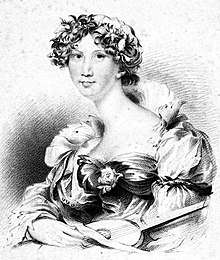Anna Maria Porter
Anna Maria Porter (1780–1832) was a British poet and novelist.

Life
The sister of Jane Porter and Robert Ker Porter, she was born in the Bailey in Durham, England. Her father, William Porter (1735-1779), served as an army surgeon for 23 years and died before her birth. He is buried in St Oswald's Church, Durham.
Anna, being fair-haired, pretty and gay, was nicknamed 'L'Allegra'. After the death of the father the family settled in Edinburgh, where they enjoyed the friendship of Walter Scott.[1] Anna at the age of 12 published Artless Tales. She was in London by the 1790s, publishing verse in the Universal Magazine. After Artless Tales, she also wrote a short novel Walsh Colville published anonymously in 1797. Though her sister was the more popular writer, Anna was the more prolific. The Hungarian Brothers (1807), a historical romance set against the French Revolutionary Wars, was a success and went into several editions.
Anna also produced the humanitarian Tales of Pity on Fishing, Shooting and Hunting in 1814, and collaborated with her sister on collections of stories. In all, she published some thirty works, many being translated into French. Anna Maria Porter died on 21 September 1832 from a typhus fever at the house of Mrs. Colonel Booth, Montpellier, near Bristol. She was buried at the churchyard of St. Paul in that city.
Selected works
- Artless Tales vol. 1 (1793)
- Artless Tales vol. 2 (1795)
- Walsh Colville (1797)
- Octavia (1798)
- The Lake of Killarney (1804)
- A Sailor's Friendship, and a Soldier's Love (1805)
- The Hungarian Brothers (1807)
- Don Sebastian; or, The House of Braganza (1809)
- Ballad Romances, and other Poems" (1811)
- Tales of Pity on Fishing, Shooting, and Hunting, intended to inculcate in the mind of youth, sentiments of humanity toward the brute creation (1814)
- The Recluse of Norway (1814)
- The Knight of St. John (1817)
- The Fast of St. Magdalen (1818)
- The Village of Mariendorpt (1821)
- Roche-Blanche; or, the Hunters of the Pyrenees (1821)
- Honor O'Hara (1826)
- Tales Round a Winter Hearth (1826; a collaboration with Jane Porter)
- Coming Out; and The Field of Forty Footsteps (1828; a collaboration with Jane Porter)
- The Barony (1830)
References
- McLean, Thomas (2007). "Nobody's Argument: Jane Porter and the Historical Novel". Journal for Early Modern Culture Studies. 7 (2): 88–103.
Bibliography
